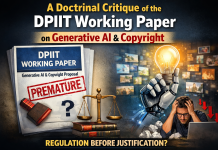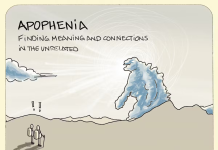Introduction: A Tale of Two Rights
Copyright Act, 1957 provides two kinds of rights for the authors – 1.) economic rights (Section 13), and 2.) moral rights (these are ‘Special’ rights as per Section 57). Both these kinds have separate jurisprudential backings (we explained something here). The former is majorly backed by ‘Utilitarian theory’ (the predominant justification?) which justifies IP on the notion of public good and public interest as statutory protection of IP incentivizes more people to engage in a creative activity, resultantly, society’s creative corpus increases and the public get benefitted. Whereas moral rights are (one may extend social planning theory to justify these rights) justified by personality theory which rationalizes IP protection on the idea that “an IP is an expression of its creator’s personality” and the state should protect such personality. You may wonder what is so ‘special’ in these rights (moral rights) when both (economic and moral rights) are given in the statute for the authors? Does the specialty lie in the rights per se (who can own and enforce them) or it is in their practical implications (what is the remedy of breach)?
(Note for the readers- personality theory runs a nice (or at least an interesting?) understanding of IP justification, but, I’d recommend you ponder upon “what is so ‘personal’ in personality” after reading this thinking article by Jessica D. Litman namely The Public Domain.)
The Case in Question
I raise these questions in the light of a dispute Sweety Priyanka Vempati Rav Shankar vs FB India ONline Services Pvt Ltd (see order – here) that arose over the unauthorized transmission of original sound recordings by Vempati Ravi Shankar (the plaintiff’s late husband) over the internet. Being his sole legal heir, Sweety Priyanka Vempati Ravi Shankar (plaintiff) notified Facebook and Instagram regarding the presence of infringing sound recordings, however, they failed to take it down. Plaintiff filed the case for the infringements of both the economic rights and moral rights. Interestingly, the case for the infringement of economic rights makes sense because only the copyright holder has the right to communicate the work to the public (subject to the exceptions under Section 52) but the infringement of the moral rights claims is a bit vague. Sound recordings were disseminated with the author’s name, hence, no infringement of the right to paternity (attributing the name of the author) exists. For the right to integrity, the terminology in the statute is “to restrain or claim damages in respect of any distortion, mutilation, modification or other act in relation to the said work if … or other act would be prejudicial to his honor or reputation.” The wordings ‘other act’ seems to broaden the scope of the provision and includes even those uses of the works which the author does not like (aka subjectivity test). The other way to decipher this is from the eyes of the public as to what would people think of the concerned use (objective test). Indian courts do not explicitly use this subjective-objective tests terminology, however, their implications in the judgments are apparent.
(I don’t intend to get into the nitty-gritty of the case here but only intend to raise some questions, those interested can read this detailed post on SpicyIP by Varsha here.)
Questions to Ponder Upon
SO, all of this looks fine (at least apparently?) involving both for-against arguments for the moral rights of producer Vempati Ravi Shankar but what happens when the producer is not a human being, but a legal person. What happens to the moral rights of such non-human (and personality-less?) authors? Can they claim moral rights which are often attached to the personality of the authors because producers don’t need to be creative as per the act, rather, they just need to finance creativity? Given the definition of a producer under Section 2(uu), how valid and logical it is to claim moral rights on the risk-initiative taking ability, and financial investment which has directly nothing to do with the originality of an expression? Isn’t the original expression of an idea a requirement for moral rights? Worse, if given such protection, will it not go against the fundamental tenets of protecting creativity and originality coming from the personality of the author? Should the terminology of Section 57 focusing on ‘special’ rights be given the same ‘general’ interpretation as that of economic rights under Section 14?
The primary international foundation of moral rights lies in Article 6bis of the Berne Convention dealing with the moral rights of authors which was incorporated into the 1928 revision to the Berne Convention. Generally, the term “moral rights” is considered to flow from the French term droit moral, however, the concept is more accurately captured by the German term Urheberpersönlichkeitsrecht, which means author’s rights of personality. (read Neil Netanel’s ‘Copyright Alienability Restrictions and the Enhancement of Author Autonomy: A Normative Evaluation’ and Christopher Yoo’s ‘Rethinking Copyright and Personhood’). Some decided cases are helpful in this regard by focusing on the human traits and characteristics for moral rights application. In the Amar Nath Sehgal case, showing the relevance of authors’ creative personal expressions in a work, the court noted (para 24) that “In the material world, laws are geared to protect the right to equitable remuneration. But life is beyond the material. It is temporal as well. Many of us believe in the soul. The moral rights of the author are the soul of his works. The author has a right to preserve, protect and nurture his creations through his moral rights.” Similarly, in Raj Rewal, the Court noted (para 31) that “The moral right was held to be the right to protection of the personal bond of the author and independent of the property right.” and Mannu Bhandari remarked that (para 8) “…The protection which law offers is thus not the protection of the artist or author alone. Enrichment of culture is of vital interest to each society. Law protects this social interest. Section 57 of the Copyright Act is one such example of legal protection. Section 57 lifts authors’ status beyond the material gains of copyright and gives it a special status” and (para 13) “Section 57 is a special provision for the protection of the special rights of the authors. The object of the Section is to put the intellectual property on a higher footing than the normal objects of copyright. The language of Section 57 is of widest amplitude. It cannot be restricted to literary’ expression only. Visual and audio manifestations are directly covered.”
But there is a case that disturbs these ‘moral-right-for-human-authors’ focused cases. In Ramesh Sippy v. Shaan Ranjeet Uttamsingh & Ors., the Bombay High Court held that both those who are creative (authors of literary, musical, dramatic, or artistic work) or those who finance creativity (sound recording and cinematography) including companies and partnership firms, etc are authors under the statute. In furtherance, it noted that (para 47) “… It may be that the author of a literary musical artistic or dramatic work has to be a natural person. However, the same is not necessarily true in the case of a cinematograph film and/or sound recording. This is so by reason of the definition of the term ‘author’ being different relating to the literary, musical artistic or dramatic work and the definition of the ‘author’ of a cinematograph film and sound recording … The author of a cinematograph film will be the persons responsible for the arrangements, particularly in the financial sense …” and (Para 48) “Therefore, I am of the view that so far as authorship and first ownership of copyright in a cinematograph film is concerned, it can be any legal person – an individual, a Partnership firm, or a company who has invested and has taken the risk of failure/ loss of investment.”
Juxtaposing the Ramesh Sippy case (which makes producer as the author of a work without throwing a light on applicability of moral authors for such authors) with Amarnath Segal and other moral rights (which bolstered the personal expression of the authors under moral rights framework) cases attracts ambiguity in copyright law (as argued – here, here, here). It shows that Section 2(d) of the Copyright Act, 1957 which is expected to answer ‘who is the author’, does not really DEFINE who is an author, rather, it PROVIDES who is an author. This judicial contradiction in moral rights as evident from Amarnath Sehgal (and similar cases) and (or versus!) Ramesh Sippy also discomforts those judgments which have necessitated the requirements of “skill, judgment, and labor” as a primary yardstick to become an author of original work. However, the same seems inapplicable to ‘producers’ who are authors by the virtue of their financial and risk-taking capacity, not by their creative capability. No wonder, if someone argues for the producer by highlighting their artistic decision-making powers and creative capability underlined in the wordings responsibility and initiative. However, had it been so, the legislature would have put them under the same test ‘skill, labor, and judgment test’ taking into account the collective nature of cinematography work. But this is not the case, then why are producers given separate treatment? Are they more equal than others?
I don’t know, nor will ever wish to settle on this. Through this post, I am no way questioning the importance of producers in movie making, we do have (and have had) producers who are well-versed with cinematic settings. However, in my opinion, the non-human authors (who should be bracketed as owners) such as producers should have nothing to do with moral rights as the jurisprudence of such rights has a strong footing in human authors as prevailing in the France and Continental Europe. However, if there arises a situation where their (non-human producers) interests are in the danger, remedies should be claimed under other civil and criminal laws.
Note:- I am deliberately keeping these questions open without reaching any legal conclusion for the readers who can provide or think further arguments on whether producers (esp. the legal persons) can be given moral rights, and if yes, what is the jurisprudential and historical backing for the same?
(On a tangential note, do you think or can argue that there is already scope for the rights of non-human entities in India which can be extended to machines? Maybe!)
Notable Readings:
- Moral rights under Copyright laws: A Peep into Policy (Patt 1, Part 2, and Part 3)
- Yoo, Christopher S., “Rethinking Copyright and Personhood” (2019). Faculty Scholarship at Penn Law. 423. https://scholarship.law.upenn.edu/faculty_scholarship/423
- IMMANUEL KANT ON INTELLECTUAL PROPERTY by Riccardo POZZO https://www.researchgate.net/publication/250048266_Immanuel_Kant_on_intellectual_property
- Roberta Rosenthal Kwall, The Soul Of Creativity: Forging A Moral Rights Law For The United States
- Justin Hughes, The Personality Interest of Artists and Inventors in Intellectual Property, 16 CARDOZO Arts & ENT. L.J. 81 (1998).
- Stewart E. Sterk, Rhetoric and Reality in Copyright Law, 94 Mich. L. Rev. 1197 (1996). Available at: https://repository.law.umich.edu/mlr/vol94/iss5/2 https://repository.law.umich.edu/mlr/vol94/iss5/2/
- Law, Ethics And The Visual Arts 5th Edition By John Henry Merryman, Stephen K. Urice, Albert E. Elsen Edward J. Damich,
- The Right of Personality: A Common-Law Basis for the Protection of the Moral Rights of Authors, 23 GA.L.REV.1, 26–27 (1988).
- Neil Netanel, Copyright Alienability Restrictions and the Enhancement of Author Autonomy: A Normative Evaluation, 24 RUTGERS L.J.347, 359 (1993).
- Martin A. Roeder, The Doctrine of Moral Right: A Study in the Law of Artists, Authors and Creators, 53 HARV.L.REV.554, 557 (1940)
Image source : here












